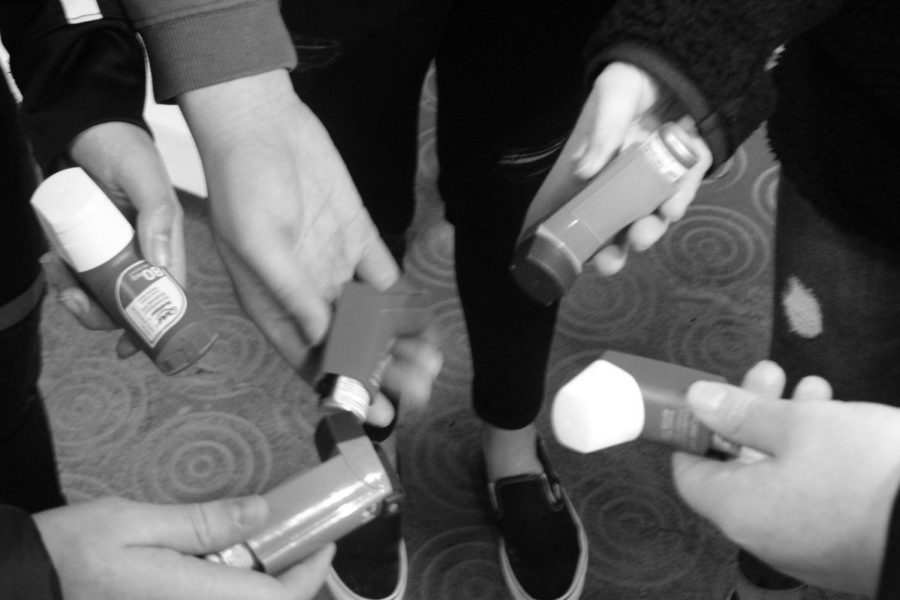Swim center air quality needs to be addressed
Swimmers have their inhalers available on the pool deck during practice and meets. Is the air quality at the pool responsible for the the high rates of asthma among the swimmers?
February 27, 2019
Note: This story first appeared in the January issue of Hi-Spots.
A number of varsity swimmers have inhalers. The environment at the Tigard Swim Center may be contributing to their health issues, and it is time for people to take a serious look at this issue.
Several THS swimmers have reported asthma and related breathing problems. During practices, swimmers go to the locker rooms to use their inhalers. This causes athletes to miss important parts of main sets and important instruction such as training. Could their participation in swimming be contributing to their health issues and how much can the environment be changed to improve their health?
At the most recent home meet, 11 swimmers brought inhalers with them on the pool deck. As the season has progressed this number has grown.
Recently varsity captain and junior Emma Vu had to go to urgent care in order to improve her breathing.
“I’ve always noticed when the pool is not well ventilated because I start coughing, but it hadn’t gotten
bad until this season for me, even though I’ve been swimming for eight years.” Vu said. She’s not alone; a poll taken on the THS Swim ́s instagram showed that out of 26 swimmers, 57 percent of those swimmers report that the pool makes their asthma symptoms worse.
Even athletes that don’t have asthma have needed to step outside in order to get fresh air. Fellow varsity captain and senior Eli Maher, who doesn’t suffer from asthma, has reported taking frequent breaks to catch his breath.
“During the winter time, the ventilation inside the pool becomes very poor and makes it difficult for me to catch my breath,” Maher says, “It becomes very hard to breathe, and causes pain in my lungs and diaphragm due to the very humid environment.”
Here’s the science behind it. According to Asthma.net it’s not the chlorine itself that’s causing the asthma and breathing problems. The chlorine reacts with the organic material in the water, in other words, dirt, body oils and, yes, pee, and creates a chemical reaction that emits a toxic gas. Because this
gas is heavier than air it sits low on the water where the swimmers are trying to breathe. This gas can generate inflammatory cells to line swimmers sinuses and airway, which causes irritation.
John Ruzicka, the coach of the Tigard High School Team, explains “…A lot of times during practice, we open the door or turn on a fan, even if it’s 20 degrees outside, just to add that extra circulation. We’re getting air into [our swimmers] rather than just chlorine gas, but yeah, health is more important than practice time.”
Spectators during swim meets have also blamed their headaches from the pool’s atmosphere. Meets are when the Tigard Pool becomes jam-packed with spectators eager to watch these swimmers compete, and the ventilation system can’t keep up. With each athlete’s family and friends eagerly waiting in the stands and the pool deck packed with swimmers and officials, the space becomes extremely cramped. Other pools don’t have this problem. At the Tualatin pool, for example, there is a lot more deck space for swimmers and seating space for their spectators. Ventilation might also be better on deck.
“My breathing is worse at Tigard than Tualatin, but I don’t think it has to do with asthma,” senior Ben Miller said.
A decorated swimmer for many years, he has been in many pools throughout his career, including indoor and outdoor. “Yes asthma can make it harder to breathe, but the difference is because of problems in [the] air quality. Tigard just has the chemicals more prominent in the air with not quite as good filtration.”
Because of the smoke from wildfires in recent years, OSAA changed the guidelines for outdoor sports practices. This was done to protect the lung health of athletes in the fall. Should people consider the lung health of indoor athletes too? The Tigard Aquatic Center, like all the swim centers around town, has a responsibility to its athletes.
The air quality in the pool needs to be addressed before healthy athletes face a lifetime of consequences simply for participating in a sport they love.











